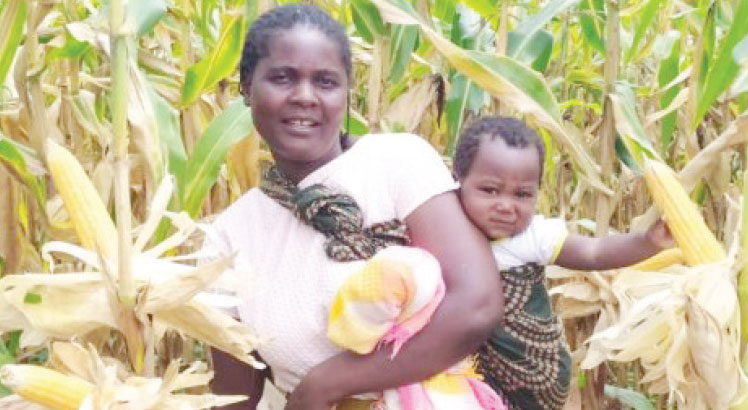No easy goodbye to maize
In Malawi, maize is food and food is maize. The staple grain defies geographic and political divides years after President Lazarus Chakwera pleaded for cutbacks.
Launching a nationwide nutrition initiative in August 2021, he dared the nation to find the courage “to face the painful truth” about over-dependence on nsima, a meal made from maize flour.
“That painful truth is that if we do not diversify our daily diet to include foods like cassava, bio-fortified sweet potatoes, bananas and the like, we will continue to fall short of meeting our nutritional needs,” said the President.
However, the nation remains adamant.
Even in the government’s lingo, low maize production spells hunger despite plenty of replacements, including more nutritious foodstuffs.

everyone grows up with
Policymakers continue to proclaim maize shortage as a national emergency as did colonialists in 1949.
The Malawi Vulnerability Assessment Committee estimates that about 4.4 million Malawians require food aid due to low maize harvests.
However, calls for diversified diets and crop diversification are rising as maize yields keep falling due to climate change, barren soil and shrinking land size per person.
The rise and fall of maize is ironic for village head Mchenga, 61, who grew up eating mtandaza or kondowole, nsima from dry cassava.
Before the maize coup, cassava, potatoes and bananas were daily bites in Phalombe, Mulanje, Thyolo, Chitipa, Nkhata Bay and Karonga districts.
“Despite chronic hunger, our area remains a food basket since we produce a lot of cassava, sweet potato, rice and maize. However, I last ate mtandaza in 2010,” she states with nostalgia.
Mchenga, from Traditional Authority (TA) Phweremwe in Phalombe, fondly recalls harvesting at least 15 bags of cassava and 20 bags of potatoes from a piece of land that scarcely produce five bags of maize a year.
“I used to sell surplus in the neighbouring Mozambique and South Africa,” she recounts. “We also grow less maize than the tubers which were our staple.”
She reckons the switch to maize has fuelled hunger and poverty as the crop keeps failing due to erratic rains.
“Despite the low yields, everyone, even the government, is talking about maize. The subsidy programme also targets rain-fed maize, which is unpredictable,” she says.
The Ministry of Agriculture estimates that maize production dropped by 5.6 percent from 3.71 million metric tonnes (MT) in 2022 to 3.71 MT in 2023.
The monotonous diet, watered by tricky rains, slows the country’s race for global Sustainable Development Goals to end hunger, malnutrition, poverty and inequality as all the 28 districts are highly vulnerable to climate-related shocks.
The risk is compounded by archaic farming methods, low mechanisation, environmental degradation and low access to finance.
Agriculture economist Blessings Botha says food availability goes beyond maize production.
His 2021 study into the national food basket, which includes maize, rice, sorghum and millet, faulted the government for “leaving out other important crops”.
The findings read: “Recent agricultural estimates indicate good harvests for roots and tubers such as potatoes, sweet potatoes and cassava, approximately 14 million tonnes, yet all are not factored into the food balance sheet. “The inclusion of these other crops has the potential to promote dietary diversity.”
This contradicts the State-sponsored demands for diversified diets.
Dr Willard Navicha, a food scientist from Malawi University of Science and Technology (Must), says every nation’s staple is deeply rooted in its history and culture.
To him, maize is to Malawi what rice is to China and Japan.
“The diet of most African countries includes a dish from cereal flour, so Malawi is not the only country where maize remains a crop of nutritional importance,” says the researcher.
He says the political backing for maize production partly strengthens resistance to expanded diets.
He explains: “Maize has had political support throughout Malawi’s history. In 1947, the British colonial government established a Maize Control Board to maintain adequate supplies and minimum prices.
“In 1952, the African Produce and Marketing Board was created to control agricultural production and marketing of African produce, including maize.”
Since independence in 1964, the government has supported maize production through different programmes.
These range from founding president Hastings Kamuzu Banda’s universal agricultural subsidies, crop inspection tours and price controls to targeted subsidies renamed Starter Pack by his successor Bakili Muluzi, Farm Inputs Subsidy Programme by Bingu wa Mutharika’s and Affordable Inputs Programme by the Chakwera adminstration.
The regimes of Joyce Banda and Peter Mutharika refused to scrape the subsidy widely criticised for leaving beneficiaries’ livelihoods hand-to-mouth and dependent on food aid.
“Kamuzu’s crop inspection was targeting maize just as his successors have touted food security, especially maize, as a gimmick to woo voters during campaigns,” says Navicha.
He also faults non-governmental organisations, academia and the private sector for similarly promoting maize, “overshadowing hundreds of amazing indigenous foods.
The maize-centred diet exposes the country to hunger amid abundant alternatives.
For instance, more than 4.4 million Malawians needed relief maize last year as tongues wagged about a bizarre swell in sweet potato yields.
“The nation has not taken advantage of the bumper potato harvest to boost food security as maize remains the priority,” Navicha says.
Secretary for Agriculture Dickxie Kampani says the government backs demands for diversified diets.
“Our food balance sheet includes all major foods. You should help to change people’s mindsets on staple food,” he said.
NEXT: The fall and fall of Admarc. Those who feel the pinch have a say.






I wanted to express how wonderful your post is. I could tell you were an authority on the subject because of how obvious it was. If you don’t mind, I’d like to sign up for your RSS feed so I can receive updates whenever you publish new content. Many thanks, and please continue your enjoyable job.